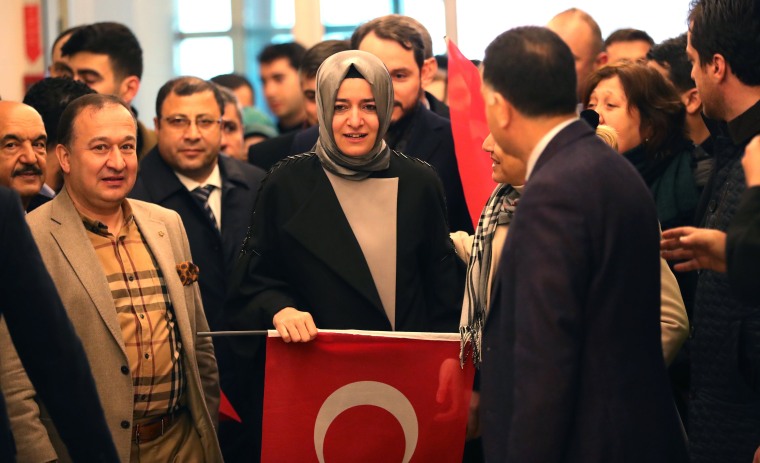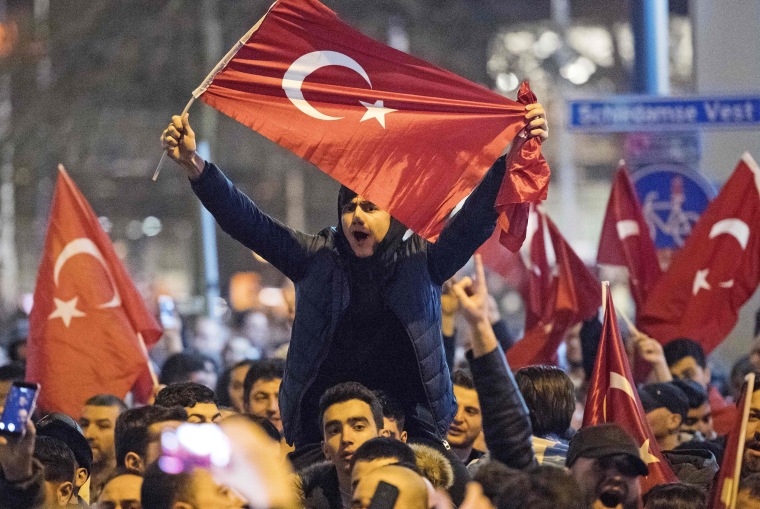Police clashed with protesters outside the Turkish consulate in the Dutch city of Rotterdam early Sunday, as a diplomatic spat suddenly pushed relations between the two countries to a historic low.
The dispute arose after Turkish ministers were barred from speaking at rallies in Holland. Dutch authorities expressed unease at Ankara campaigning among the country’s Turkish population, as ministers seek support for a referendum which could grant sweeping new powers to Turkey's president.
Rotterdam police said they arrested 12 protesters when a demonstration outside the Turkish consulate devolved into rioting.
Dutch police used dogs and water cannons early on Sunday to disperse the crowd, which threw bottles and stones. Several demonstrators were beaten by police with batons, an eyewitness told Reuters. Officers on horseback clashed with protesters while others advanced on foot with shields and in armored vans.

The protesters had gathered after Turkey's Family Minister, Fatma Betul Sayan Kaya, was prevented by police from entering the Turkish consulate in Rotterdam.
She subsequently said on Twitter that she was escorted to the German border by Dutch police, a move she branded “fascist oppression.”
The move came less than a day after Dutch authorities prevented Turkey’s Foreign Minister, Mevlut Cavusoglu, from flying to Rotterdam.
Turkish President Recep President Tayyip Erdogan on Sunday called on international organizations to speak out against the Netherlands, and impose sanctions on the country. Turkey has promised to retaliate in the “harshest ways,” to the ministers' barring.
The Dutch government, which stands to lose heavily to the anti-Islam party of Geert Wilders in elections next week, said it considered the visits undesirable and "the Netherlands could not cooperate in the public political campaigning of Turkish ministers in the Netherlands."
The government said it saw the potential to import divisions into its own Turkish minority, which is divided between supporters and opponents of Erdogan. Dutch politicians across the spectrum said they supported Prime Minister Mark Rutte's decision to ban the visits.

In Istanbul, the Associated Press reported that a man climbed onto the roof of the Dutch consulate in the city, and replaced the flag with the Turkish one.
The dispute escalated quickly — Cavusoglu threatened the Netherlands with sanctions if his flight to the country was prevented from landing. After the Dutch then withdrew landing rights for Cavusoglu’s flight, Erdogan at a rally Saturday called the Dutch “Nazi remnants” and “fascists."
Rutte told Reuters that the threat of sanctions had forced his government to ban the ministers from entry.
“We can never do business under this kind of blackmail," he said, adding that he was shocked to see one of the ministers try to get to a Rotterdam rally by car after the government had made clear she was not welcome.
He added that he would do everything he could to de-escalate the situation.
"I've never experienced this before, but we want to be the more prudent party," he said.
The escalating tensions are affecting other nations' diplomatic relations as well.
According to Reuters, Denmark's Prime Minister Lars Lokke Rasmussen suggested on Sunday that Turkey's Prime Minister Binali Yliderim postpone his trip to Denmark because of the disagreement.
"With the current Turkish attacks on Holland the meeting can not be seen separated from that. I have therefore proposed to my Turkish colleague that the meeting will be postponed," Rasmussen said in a press release.